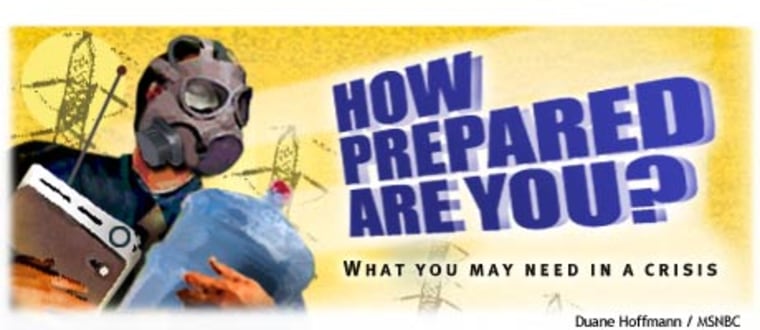Hope for the best, prepare for the worst. Experts believe that old saw is generally sound advice. But where does a homeowner draw the line between “vital supplies” and “panic buying?” In light of the government’s new terror alert, MSNBC.com contacted numerous government resources, emergency management specialists and state Web sites, and prepared a list of those things considered essential, and others less likely to be needed.
What you’re likely to need
Emergency management experts and the Red Cross recommend the following in case of a terrorist-related national emergency. Luckily, many of these items are the very same things considered essential preparations for natural disasters:
First-aid kit and essential medications: These should include activated charcoal and ipecac syrup; adhesive tape, antiseptic ointment, bandages in assorted sizes, a blanket, cold pack, disposable gloves, gauze pads and roller gauze, hand cleaner, plastic bags, scissors and tweezers, and a triangular bandage. Other first-aid items to consider include rubbing alcohol, anti-diarrhea medicine, laxatives, antacids and antiseptic sprays.
Canned food and a can opener.
Cooking and heating: You can get portable generators for anywhere from $500 to $3,000. Gasoline generators need ventilation, so indoor use isn’t recommended, but they’re generally more powerful than electrical generators. Electrical generators can be safely used indoors and out. They’re easier to use — you can plug them in and charge them while power’s available; when power’s out, you can plug appliances into the generator and turn them on. But electrical generators usually have lower wattage, for fewer devices. To stay warm, a portable catalytic heater, a staple for outdoor-minded vacationers, would be effective for indoor use. They heat enclosed spaces quickly and safely, without open flames. They’re generally priced under $200.
Foods: Nonperishables like nutrition bars with protein and carbohydrates; peanut butter; dried fruit; vitamin supplements; healthy snacks like trail mix, raisins and nuts; and dried foods like beef jerky. Keep food in the driest, coolest location in your home. If water is limited, try to avoid salty foods, which cause thirst. Prepare a food supply that could last two weeks, even though most any foreseeable emergency probably won’t last that long.
Water: Emergency agencies recommend stockpiling one gallon per person per day, for each family member. People at normal activity levels need to drink at least two quarts a day; more is needed in warm climates, and by children, pregnant women, nursing mothers and those with health conditions. Store it in sealed containers that won’t break.
Protective clothing, rainwear, and bedding or sleeping bags.
A battery-powered radio, flashlight and extra batteries: Consider flashlights with krypton or halogen bulbs, which offer brighter illumination and longer bulb life.
Special items for infant, elderly or disabled family members: For instance, diapers and formula or prescription medical supplies.
Written instructions on how to turn off gas, electricity and water if authorities advise you to do so.
A multipurpose tool, such as a Swiss Army knife and various other items you might have had in the Boy or Girl Scouts: a compass, needle and thread, matches in a waterproof container, storage containers, a fire extinguisher and signal flares.
Special considerations: If you or members of your family are physically handicapped, stock extra batteries and tire sealants for wheelchairs or motorized scooters; store disaster supplies with large-print letters or in Braille if you are blind or visually impaired; and keep pads and pencils at the ready with information on sign language if you are deaf or speech-impaired.
Keep a little cash on hand.
Secondary items
Some people have stocked up on the following items, which experts would not discourage but which are considered beyond what’s absolutely necessary:
Gas masks and chemical suits: People should not be scared into buying gas masks and chemical suits, says Secretary of Health and Human Services Tommy Thompson. The federal Centers for Disease Control and Prevention report that state and local health departments will keep the public informed about what to do in the event of a biological or chemical attack. An attack is more likely to occur in a large concentrated area rather than in the home, so the chance that someone would have a gas mask or a chemical suit at the time of the attack would be small.
Electronic home security systems: Russell Kormann, a psychologist and associate director of Rutgers University’s Post-Traumatic Stress Disorders Program, says the sales boost in home security systems, like products marketed by ADT and Brinks, “is more psychological than anything else. Now, a terrorist isn’t coming to John Q. Public’s house; he’s going to go blow up a bomb downtown,” Kormann says. “But a security system gives you something you can actively do. It increases a person’s sense of safety.”
Potassium iodide, which is used to prevent thyroid cancer by shielding the thyroid gland from radioactive iodine. Potassium iodide blocks no other form of radiation, and protects no other organs of the human body. And in a November 2001 report, the U.S. Food and Drug Administration, while admitting that potassium iodide is “safe” and would “be effective in reducing the risk of thyroid cancer,” also cautioned that it can have side effects, including gastrointestinal disturbances and allergic reactions.
Water purification kits: MSNBC terrorism expert Steve Emerson said it would be difficult for terrorists to contaminate a major reservoir. The amount of chemical or biological agents necessary to do so would be hard to obtain. However, other types of disasters - a burst dam or a compromised sewage treatment facility - could make these kits useful.
Vaccines and antibiotics: Emerson suggests you not stockpile these, since an adverse reaction to them could be dangerous.
Source: MSNBC research, American Red Cross, FEMA, Rutgers University.
